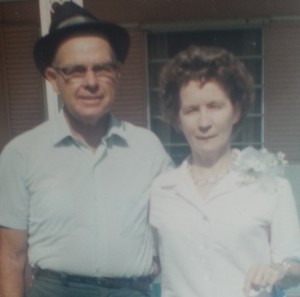In battered tennis shoes we shuffled through leaves of gold and red. A wooded area on his family’s land. Kenny pointed to a brown clump of dead vines gracing a tree stump. End-of-Summer rains hadn’t arrived and we easily crossed the creek bed to reach them. I grinned.
Yeah, these oughta smoke well.
A few pocket knife maneuvers and we were set. I touched a lighted match to our smokes. We inhaled. And instantly discerned. How overrated the vine-smoking thrill was. Tears blocked our vision. We gagged on the acrid smoke. My coughing trailed off in time.
Kenny and I did what country kids did in the 1950s. Some things – inhaling fiery toxins – could have injured us. Badly. Surviving childhood itself, was indeed, a notable feat.
When a speeding semi-truck spooked my horse Bill and he, in turn, hurled his passenger (Kenny) to the grass embankment.
While breaking up a field of sod.
Look out, Jerry. It’s coming down on us.
Towing a farming implement called a harrow, I had steered a corner too sharply. The harrow swung upward, then slammed downward. It penned Kenny’s tennis shoe to the tractor’s axle casing where he stood. He withdrew his foot. Prying the shoe free I handed it over – thankful for unbroken bones.
Dodging BBs while firing on each other with Daisy rifles. Years later we realized we each had won – We ended all the shootouts with our eyesight intact.
My friend Kenny and I jumped from roof sheds. We swam in snake-colonized ponds, ‘fished for crawdads with bacon bits. And lit up discarded Marlboros we happened upon. This only barely edged out – pleasure-wise – the vine-smoking venture.
With my brother, Tim’s help we mastered the basics of guitar – devoting hour-on-hour to the happy cause. We formed a musical group, Tim, Kenny and I. A a trio with three-part harmony. Even naming ourselves – Sons of Faith. What fun. Singing at the Living Way and a few other churches.
Kenny. The funnest guy I knew. Quick wit. Contagious smile. Musical.
He soaked up kindness – where it was found. Like a sponge.
And Kenny limped. Though not physically.
Alcohol cheated him of youth. In a measure.
Misuse of liquor. Not his own. Not yet. And not entirely.
In several ways, though, Kenny displayed not poverty – but richness.
Rich in personal charm. A law court could have introduced Kenny, People-person. Exhibit A
Wealthy in big-heartedness. Opening himself to a big-hearted God brought him there.
But he did know scarcity.
It’s been said, alcohol impoverishes the brain.
We might add – And people. At least the abuse of it.
Kenny’s family suffered lack through an absentee parent. Yes, a limping parent. Absent emotionally; often physically. The family dependents struggled to get by while resources of the household wage-earner fed an addiction.
Kenny’s music then took him to California. To a music label. And Into a measure of fame. For a time.
Kenny was offered a drink. This by a religious leader. The drink led to another. He spiraled.
Years afterward – adrift – on a California freeway, my awesome and hurting childhood friend met with fear. Then something else. Kenny:
I tried to navigate the freeway in my beat-up Volkswagen. Empty beer cans covered the floor all around. I leaned to the center mirror. My eyes met their own gaze. And fear hit me full force.
Who is that person? I didn’t recognize myself. I was so frightened. And I knew. It’s time.
Taking an exit I drove to the home of an almost-forgotten friend. A believer in Jesus.
Kenny’s freeway exit became his entry ramp. To his old acquaintance. Then to hope. To a twelve step group. To sobriety. Then on – astonishingly to him – to service.
Visit prison quarters today. From Arizona to California, to Oklahoma to Florida. And beyond.
Kenny’s name is known there. He’s welcome there. Every time. Among the lame ones. Ones overly-acquainted with their limps.
He speaks to their heart. Not as outsider but as peer. They warm to Kenny. His quick wit. His contagious smile. His songs and his story. He is their friend – this apprentice of Jesus. Their fellow-traveler. Limping. Some of these he’s led to recovery steps. Some to counselling sessions. Others to confession. All to Jesus. That is his desire anyway.
Kenny passes into the prison. A guard unlocks and relocks gates. They enter the meeting area. Confined men glimpse him. Some with recognition. These men smile.
For Kenny, he’s warmed to the gathering before arriving.
He takes up his instrument and breaks out in a fun impersonation of Johnny Cash. Hands clap in rhythm. Smiles flash his way.
Those who’ve seen and heard him before are happy for the ice-breaking music. But their eyes are trained on the small podium before Kenny. They’ve spotted what their eyes sought. The worn book. Kenny’s Bible.
He’ll shift to ‘The Old Rugged Cross’ and other hymns soon. A prisoner leans back; inhales slowly. Like welcoming an aroma. He hums to the music – and looks again to the podium.
Kenny’s here today. With the book.
Today is a good day.
http://kennymundsministry.org/
©2015 Jerry Lout



